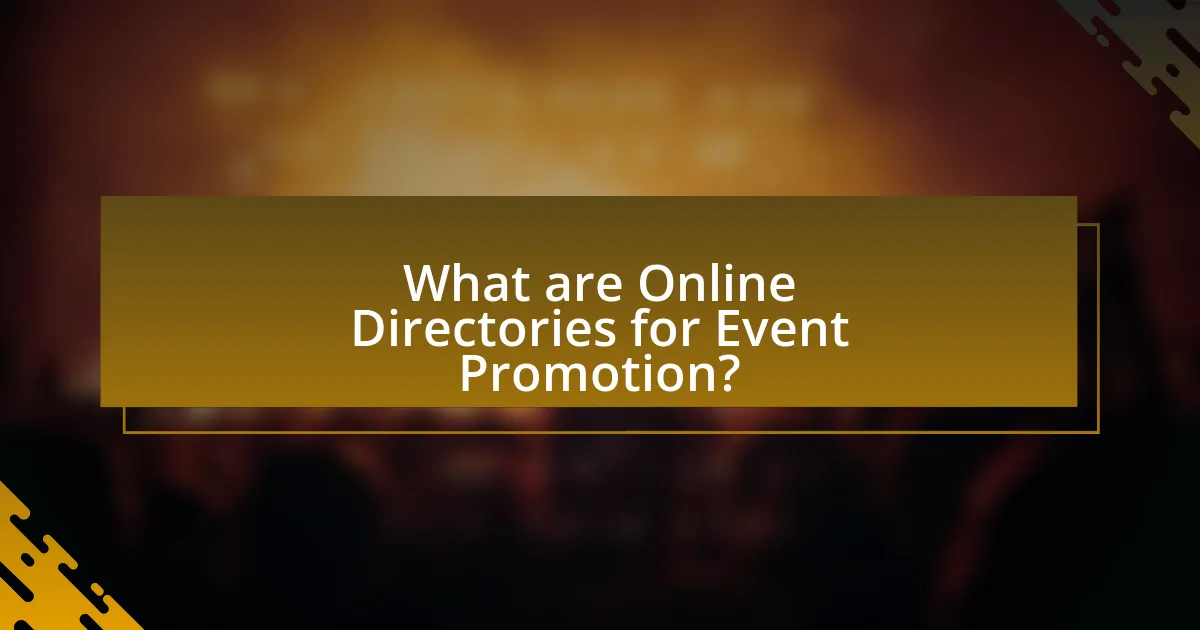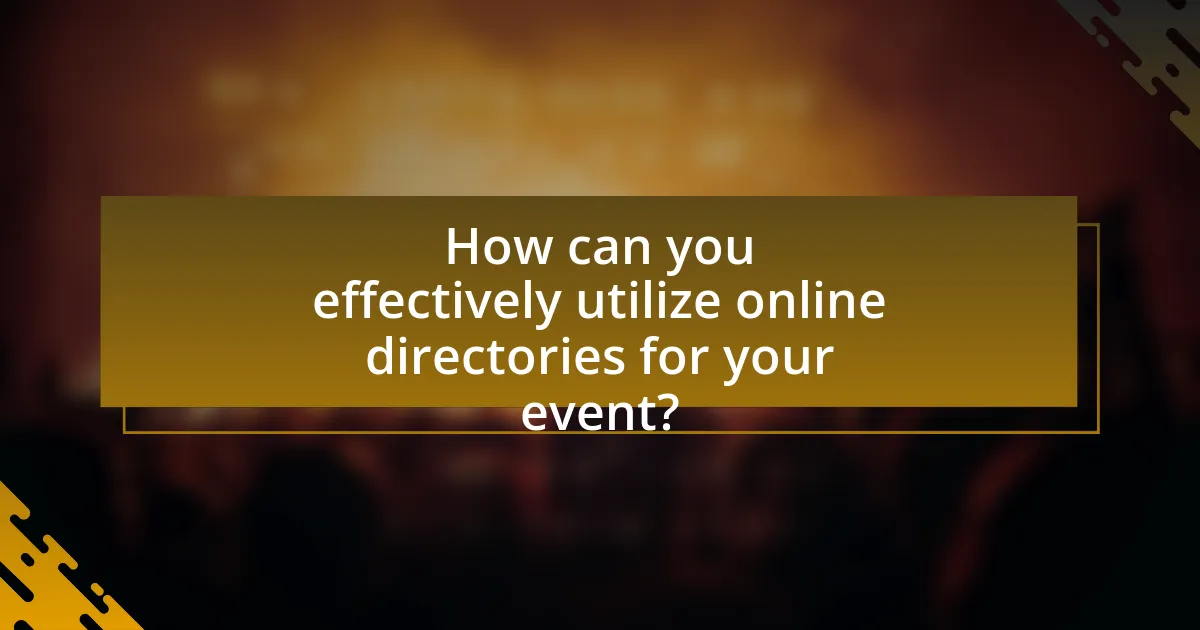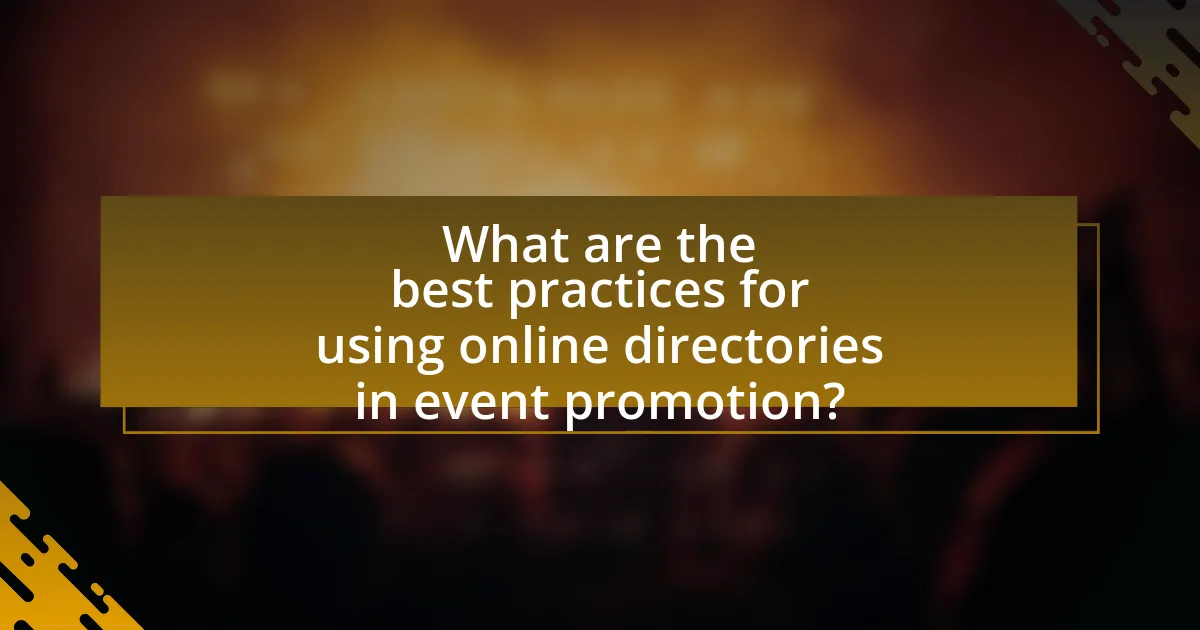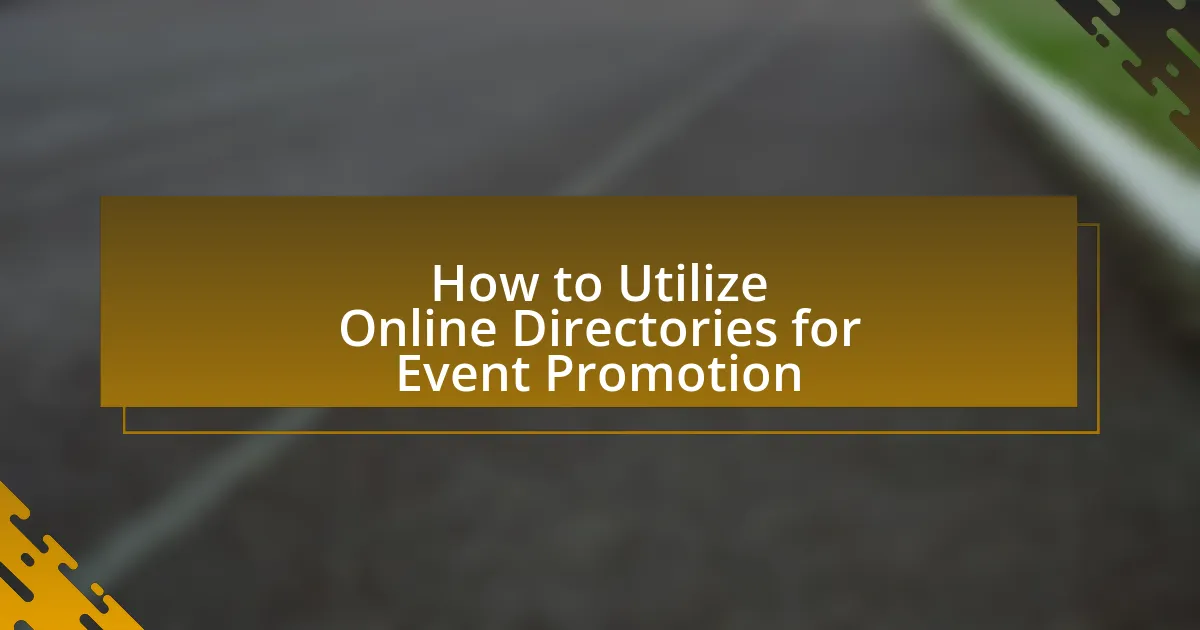Online directories for event promotion are essential platforms that enable event organizers to reach a wider audience by listing their events based on location, date, and category. This article outlines the functionality of these directories, the types available, and the interaction methods users employ to discover events. It emphasizes the importance of accurate listings, keyword optimization, and engagement strategies to enhance visibility and attendance. Additionally, the article provides best practices for utilizing online directories effectively, measuring success through key performance indicators, and avoiding common pitfalls that can hinder event promotion.

What are Online Directories for Event Promotion?
Online directories for event promotion are platforms that list events, allowing organizers to reach a broader audience. These directories enable users to search for events based on location, date, and category, increasing visibility for the events listed. For instance, platforms like Eventbrite and Meetup serve as popular online directories, facilitating the discovery of local events and activities. By utilizing these directories, event organizers can enhance attendance and engagement, as studies show that events promoted through such platforms often attract larger crowds compared to those that are not listed.
How do online directories function in the context of event promotion?
Online directories function as platforms that aggregate and display event information, making it accessible to a wider audience. These directories allow event organizers to list details such as date, location, and ticketing information, which enhances visibility and reach. For instance, platforms like Eventbrite and Meetup enable users to search for events based on interests and location, thus facilitating targeted promotion. Research indicates that events listed on multiple online directories can experience up to a 30% increase in attendance, demonstrating the effectiveness of these platforms in driving engagement and participation.
What types of online directories are available for event promotion?
There are several types of online directories available for event promotion, including general event listing sites, niche-specific directories, social media platforms, and local community boards. General event listing sites, such as Eventbrite and Meetup, allow users to promote a wide range of events to a broad audience. Niche-specific directories, like WeddingWire for weddings or FilmFreeway for film festivals, cater to particular industries or interests, providing targeted exposure. Social media platforms, including Facebook and Instagram, serve as informal directories where events can be promoted through pages and posts. Local community boards, such as Nextdoor or local news websites, focus on regional events, helping to engage local audiences. Each type of directory serves a unique purpose in reaching specific demographics and enhancing event visibility.
How do users interact with these online directories?
Users interact with online directories primarily by searching for specific events, services, or businesses relevant to their interests. They utilize search functions, filters, and categories to narrow down options, often reading reviews and ratings to inform their decisions. According to a study by the Pew Research Center, 81% of Americans conduct online research before making a purchase, indicating that users rely heavily on directories for gathering information. Additionally, users may engage with directories by saving listings, sharing them on social media, or contacting businesses directly through provided contact information.
Why are online directories important for event promotion?
Online directories are important for event promotion because they enhance visibility and accessibility to a broader audience. By listing events on these platforms, organizers can reach potential attendees who actively search for local activities, increasing the likelihood of higher attendance rates. According to a study by Eventbrite, 60% of event-goers discover events through online listings, demonstrating the effectiveness of directories in connecting audiences with events.
What advantages do online directories provide for event organizers?
Online directories offer event organizers increased visibility and streamlined access to target audiences. By listing events on these platforms, organizers can reach a broader demographic, as online directories often attract users specifically searching for events in their area. Additionally, many online directories provide tools for event promotion, such as social media sharing options and SEO optimization, which enhance discoverability. Research indicates that events promoted through online directories can experience up to a 30% increase in attendance compared to those that are not listed, demonstrating the effectiveness of these platforms in driving engagement and participation.
How do online directories enhance event visibility?
Online directories enhance event visibility by providing a centralized platform where potential attendees can discover and access event information. These directories aggregate listings from various sources, making it easier for users to find relevant events based on their interests and location. According to a study by Eventbrite, 70% of event attendees use online directories to find events, highlighting their effectiveness in reaching a broad audience. By optimizing event listings with keywords and detailed descriptions, organizers can improve searchability, further increasing visibility and attendance.

How can you effectively utilize online directories for your event?
To effectively utilize online directories for your event, list your event on multiple relevant platforms to maximize visibility. This approach ensures that potential attendees can easily find information about your event, as directories often rank high in search engine results, increasing the likelihood of discovery. For instance, platforms like Eventbrite and Meetup attract users specifically looking for events, which can lead to higher attendance rates. Additionally, including detailed descriptions, images, and links to your event’s website can enhance engagement and provide essential information to potential attendees.
What steps should you take to list your event on an online directory?
To list your event on an online directory, first, identify the appropriate directory that aligns with your event’s target audience. Next, create an account or log in to the directory platform. After that, fill out the event submission form with accurate details such as event name, date, location, description, and any relevant images. Finally, review your submission for accuracy and completeness before publishing it. This process ensures that your event reaches the intended audience effectively, as directories often have established user bases looking for events in specific categories.
What information is essential to include in your event listing?
Essential information to include in your event listing comprises the event title, date, time, location, description, and contact information. The event title clearly identifies the event, while the date and time specify when it occurs, allowing potential attendees to plan accordingly. The location provides the venue details, which is crucial for physical attendance. A detailed description outlines the event’s purpose, activities, and any special guests or features, helping to attract interest. Lastly, contact information enables attendees to reach out for inquiries or further details. Including these elements ensures clarity and maximizes engagement, as studies show that well-structured listings significantly increase attendance rates.
How can you optimize your event listing for better engagement?
To optimize your event listing for better engagement, ensure that you use clear, compelling titles and descriptions that highlight the unique aspects of your event. Engaging content attracts more viewers; for instance, listings with descriptive titles can increase click-through rates by up to 47%. Additionally, incorporating high-quality images and videos can enhance visual appeal, as studies show that visuals can increase engagement by 94%. Utilizing relevant keywords in your listing improves searchability, making it easier for potential attendees to find your event. Furthermore, including social sharing buttons encourages attendees to share the event, expanding its reach.
What strategies can enhance your event’s presence in online directories?
To enhance your event’s presence in online directories, utilize targeted keywords and optimize your event listings. By incorporating relevant keywords in the title, description, and tags, you improve searchability, making it easier for potential attendees to find your event. Research indicates that listings with optimized content can increase visibility by up to 50%, as they align better with user search queries. Additionally, regularly updating your listings and engaging with directory features, such as event categories and promotional options, can further boost your event’s prominence in search results.
How can you leverage SEO techniques for your event listing?
To leverage SEO techniques for your event listing, optimize your content with relevant keywords, meta tags, and descriptions that align with search intent. This involves conducting keyword research to identify terms potential attendees are searching for, such as the event name, location, and type. Incorporating these keywords naturally into the title, headings, and body of the listing enhances visibility in search engine results. Additionally, using structured data markup can help search engines understand the event details better, improving the chances of appearing in rich snippets. According to a study by Moz, optimizing for local SEO can increase visibility by 50%, making it crucial for event promotion.
What role do social media and cross-promotion play in directory listings?
Social media and cross-promotion significantly enhance the visibility and effectiveness of directory listings. By leveraging social media platforms, businesses can share their directory listings with a broader audience, driving traffic and engagement. For instance, a study by HubSpot found that social media posts can increase website traffic by up to 150%. Cross-promotion, where businesses collaborate to promote each other’s listings, further amplifies reach and credibility, as it taps into each partner’s audience. This collaborative approach not only boosts visibility but also fosters community engagement, making directory listings more impactful in event promotion.

What are the best practices for using online directories in event promotion?
The best practices for using online directories in event promotion include ensuring accurate and complete listings, utilizing relevant keywords for search optimization, and actively engaging with users through updates and responses. Accurate listings enhance visibility and credibility, as studies show that 70% of consumers trust online reviews and listings when making decisions. Utilizing relevant keywords improves searchability, as directories often rank listings based on keyword relevance. Engaging with users fosters community and encourages attendance, as events with active social media presence see a 30% increase in participation.
How can you measure the effectiveness of your online directory listings?
You can measure the effectiveness of your online directory listings by analyzing key performance indicators (KPIs) such as traffic, conversion rates, and engagement metrics. Traffic can be assessed through analytics tools that track the number of visitors directed from the directory to your website. Conversion rates indicate how many of those visitors take desired actions, such as signing up for an event or making a purchase. Engagement metrics, including time spent on the site and bounce rates, provide insights into user interest and interaction. According to a study by HubSpot, businesses that actively track these metrics can improve their marketing strategies by up to 30%, demonstrating the importance of measuring effectiveness in online directory listings.
What metrics should you track to evaluate success?
To evaluate success in utilizing online directories for event promotion, track metrics such as website traffic, conversion rates, engagement rates, and return on investment (ROI). Website traffic indicates the number of visitors directed from the directory to your event page, while conversion rates measure the percentage of those visitors who take a desired action, such as registering for the event. Engagement rates reflect how users interact with your event listing, including clicks and shares, which can indicate interest levels. ROI quantifies the financial return generated from the promotional efforts compared to the costs incurred. These metrics provide a comprehensive view of the effectiveness of your promotional strategies.
How can feedback from directory users improve future listings?
Feedback from directory users can significantly enhance future listings by providing insights into user preferences and experiences. This feedback allows directory managers to identify which features or information are most valuable to users, leading to more relevant and appealing listings. For instance, if users frequently request additional details about event accessibility or specific amenities, future listings can be tailored to include this information, improving user satisfaction and engagement. Additionally, analyzing user ratings and comments can highlight common issues or areas for improvement, enabling directory managers to refine their criteria for listing events. This iterative process of incorporating user feedback ensures that listings remain current and aligned with user expectations, ultimately driving higher participation rates and better event promotion outcomes.
What common mistakes should you avoid when using online directories?
Common mistakes to avoid when using online directories include neglecting to keep your listing updated, failing to optimize for relevant keywords, and not monitoring reviews or feedback. Keeping your listing current ensures accurate information, which is crucial as 70% of consumers trust online reviews and listings. Optimizing for keywords enhances visibility; studies show that 93% of online experiences begin with a search engine. Lastly, monitoring reviews is essential, as 84% of people trust online reviews as much as personal recommendations.
How can inaccurate information impact your event promotion?
Inaccurate information can severely undermine event promotion by leading to decreased attendance and damaged credibility. When potential attendees encounter incorrect details, such as wrong dates, locations, or pricing, they may choose not to attend, resulting in lower turnout rates. For instance, a study by Eventbrite found that 60% of event organizers reported that misinformation negatively affected their ticket sales. Furthermore, inaccuracies can erode trust in the event organizer, making future promotions less effective as audiences become skeptical of the information provided.
What are the pitfalls of neglecting directory engagement?
Neglecting directory engagement can lead to decreased visibility and reduced attendance at events. When organizations fail to actively participate in online directories, they miss opportunities to reach potential attendees who rely on these platforms for event information. Research indicates that 70% of consumers use online directories to find local businesses and events, highlighting the importance of maintaining an active presence. Additionally, neglecting engagement can result in lower search engine rankings, as directories often contribute to local SEO efforts. This diminished online presence can ultimately hinder an organization’s ability to attract a target audience, leading to lower event success rates.
What tips can help you maximize your event promotion through online directories?
To maximize your event promotion through online directories, ensure you provide complete and accurate information about your event. This includes the event name, date, location, and a compelling description. Research indicates that listings with detailed descriptions and relevant keywords can improve visibility by up to 50% in search results. Additionally, utilize high-quality images and videos to engage potential attendees, as visual content can increase click-through rates significantly. Regularly update your listings to reflect any changes and encourage user-generated content, such as reviews and ratings, which can enhance credibility and attract more attendees.
